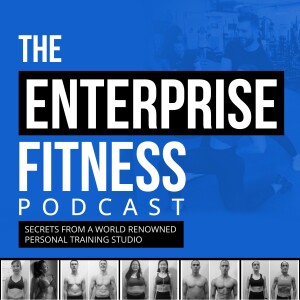
Wednesday Nov 01, 2023
S6:E26 - Hormones and Calories
In this week's episode of The Enterprise Fitness podcast, I tackle the debate: Why we get fat: calories or hormones?
The two prominent ways to assess and explain all mechanisms of diet and nutrition are calories and hormones.
On one side, a calorie is a calorie; weight loss or weight gain is merely a mathematical equation of calories in and calories out.
On the other, hormones and biochemistry send chemical messages to store calories in fat cells and overwrite appetite control.
Depending on perspective, and to the average person, both are accurate explanations for weight loss and weight gain. An army of experts, gurus, camps and zealots have emerged from these prominent perspectives.
In nutrition, there is no middle ground. You simply must pick a side, and if you don’t, you will be ostracised — a fate worse than death to a social media influencer. Today, nutrition is less about science and more about selecting ‘the science’ that matches your identity.
As a coach, I care less about why something works and more about what works. To state simply, my client pays me, so I don’t need to pick sides. I don’t need to make keto memes or shout about ‘evidence-based’ results in a grab for social media followers and sales. I’ve coached hundreds of champions and my studio has worked with thousands of clients. The two things I care about are results and client longevity. Out of necessity, I had to adapt the viewpoints of calories and hormones and practically apply both theories in the real world.
But a calorie is not a calorie…
I used to think you could gain and lose weight independent of calorie intake. Gary Taubes, author of Good Calories, Bad Calories, championed the idea that it’s insulin, not calories, that causes weight gain and weight loss. It was indeed a convincing argument. I even used my own analogy to support the hormone-based theory. I would say: if we had two groups, both with an intake of 2200 maintenance calories a day, and gave one group anabolic steroids and the other group no hormonal invention, the group that took the steroids would burn fat and build muscle despite not being in a caloric deficit. This was to point out the impact hormones have on building muscle and burning fat. My analogy did correctly point out the impact of hormones, but the impact of hormones and exogenous drugs on metabolism also needed to be addressed.
In other words, this analogy, as beautifully crafted as it is, still adhered to calories in versus calories out. The caloric baseline of those taking the anabolic steroids will increase, so the premise of the analogy is no longer true. Taking steroids will increase metabolism, hence increasing baseline calories. Let's estimate from this intervention that baseline jumps up 300 calories from 2200 to 2500 due to an increase in non-exercise activity thermogenesis (NEAT) - and that’s why they lose weight. In short, people don’t gain/lose weight because of hormones, they gain and lose weight because hormones are having an impact on their energy balance.
As such, it’s impossible to refute calories prominent role in weight loss and gain. Further to the point, Kevin Hall’s metabolic ward study in 2016 showed that for isocaloric diets with the same amount of protein and calories, eating high-carb or low-carb did not induce any significant change in weight loss/gain. In other words, when calories are equal, carbs (or fat) don’t make you fat. This study is worth noting because it's a metabolic ward study, where all factors were measured and controlled.
The fat-loving and keto-loving crew might shy away from the simple truth, but I won’t; calories count, and the insulin-only theory to obesity, as far as I can tell, has been debunked. At the very least, and more practically, calories and insulin play a simultaneous role in weight gain and loss.
Now that I’ve just scratched the surface of this topic, enjoy my full deep dive in this week's episode of The Enterprise Fitness Podcast
Available on iTunes, Spotify and YouTube (or wherever you listen to podcasts)
This deep dive is based on Chapter 3 of my book, The Enterprise Diet, which you can purchase here.
Ps. You might be thinking, why am I giving away so much valuable content away for free? I figured, what better way to earn your trust that actually helps you get the results you're looking for, for free?
If you're enjoying our content, forward this email to a friend and remember to subscribe, like and follow.
Pps. I’m running a 3 day Bootcamp of fun, training and learning! Learn more here
No comments yet. Be the first to say something!